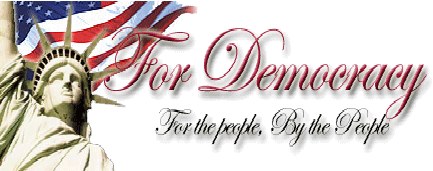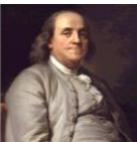All events, Philosophies, Personalities are studied from the point of view of: how much they strengthen Democracy or how much they harm Democracy.
True Democracy is a government of the People by the People. It comes from greek words: DEMOS meaning PEOPLE and KRATEIN meaning GOVERN.
All essays and articles have been written by Eric Lafayette and none can be published or reproduced without the written consent of the Author
Rome, the ancient city , Rome, and its conquering army, Rome, and its illustrious Emperor, such as Julius Caesar, Augustus, Nero and Hadrian, is the most studied and admired civilization of the ancient history. Was this exceptional civilization that lasted over one thousand years a democracy? That's what we are going to study in the following lines.
THE FIRST PEOPLE
When Rome did not exist as a city but only as a congregation of huts, its neighbors were the Greek colony to the south and Etruscan cities to the north. Progressively, the Etruscan, around 800 BC moved into the area of Rome and melted with the local people and Governed them.
Although, Romulus and Remus are considered the founders of Rome in 753 BC, they are more of a legend than a historical fact. Under the Etruscans domination Romans began to build better houses, better buildings and roads. At the same time under Etruscan kings or Etruscan domination, the different parts of Rome, which were different tribes living on some of the hills that make modern Rome today, began to be reunited by roads and common interest.
Today Historians tend to favor a melting of Etruscan and Roman more than a conquest by any of the two People. No Historian can tell with certainty if The Roman Kings starting with Romulus are From Etruscan Blood line or Roman Indigenous Blood lines
A TIMID DEMOCRACY
Probably already being inspired by the Greek civilization, they set up their first assembly named Comitia Curiata, this assembly represented the tribes and made decisions of peace or war, electing the magistrate. It was a first step. As Rome was expanding and becoming populous they reorganized their assembly and it was named Comitia Centuriata. This assembly was larger and included representatives from the Army, which were at this time citizen-soldiers.
Although this assemblies had limited powers under the King rule and these assemblies were restrictive only male, relatively wealthy and soldiers were elected, it was the timid beginning of Democracy. These events took place around 600 BC. In fact a larger percentage of the population was able to influence the decision which will decide of their fate.
The Etruscan dynasty was over-thrown shortly after 509 BC, what we called the Roman Republic has begun. A pair of consul were elected, they were given supreme power but for a limited period of time, one year only. They could also veto each others decisions.
The Senate was created in its final form, it was the legislative body in charge of approving laws and electing magistrates. It was composed with the Heads of the most influential families numbering 100 hundred.
The other body was the assembly of Roman citizens who had the task of electing the consuls. Unfortunately for democracy the members of the assembly were proposed by the senate thus enforcing the power of the senate, and for a while there was no real system of check and balances between the three different bodies; Consul, Senate and Assembly. The senate put forward the name of the assemblymen that were to be elected, after their election they themselves elected the consuls. So we can see that the real power resided in the hands of the senate.
Another quasi institution was diminishing the democracy system in Rome. It was called The Clientele. It worked a little bit like the Mafia. There were rich and powerful families members of the senate who had faithful followers called clients that they protected and helped in exchange for absolute loyalty, including voting. This system of very powerful senators families and their faithful clients distorted the democratic system in Rome.
So we can say that the Roman Republic began as a democracy but due to the exaggerated power of some wealthy families called the Patrician and the system of clientele, the democracy became more and more a system where the majority of the citizens did not have a saying in their government.
The Republic went on expanding its boundaries with a powerful army throughout Italy and beyond, with terrible hardship on its second category citizen (the Plebeians) who tried to revolt from time to time.
The final blow to the Republic was given by Julius Caesar, when after being victorious in Gaul, against the senates orders he crossed with his troops, marching towards Rome, a little river (The Rubicon) in 49 BC saying the famous sentence, "Alea Jacta est" = "the dice are cast" meaning there is no turning back. In fact he was named Dictator then Emperor. So we can consider 49 BC the date of the end of democracy in he Roman world.



















